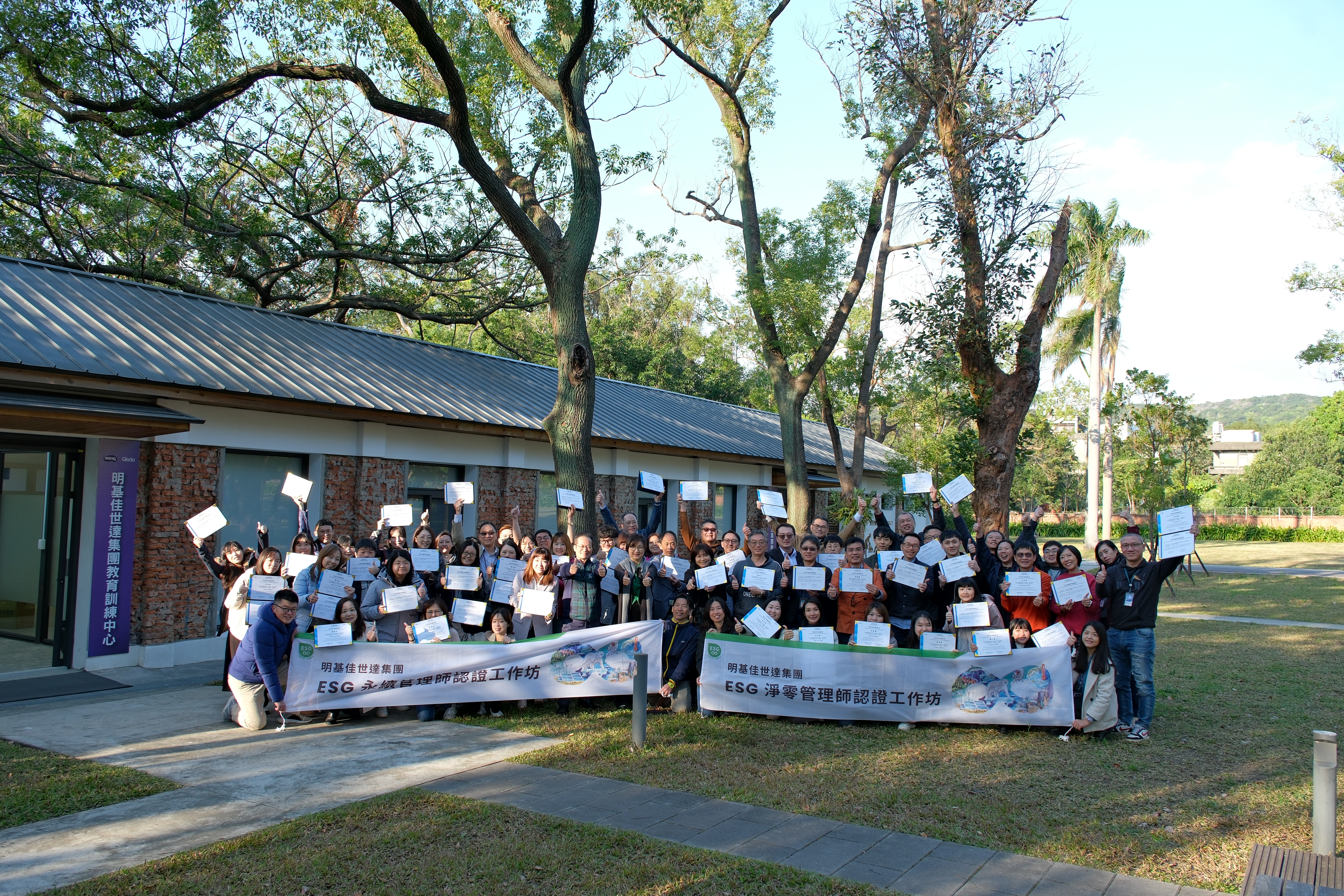ESG Sustainability Strategy Workshop: Experts guiding trend-aligned strategy—co-creating and co-thriving along a sustainable value chain




ESG Sustainability Strategy Workshop: Experts guiding trend-aligned strategy—co-creating and co-thriving along a sustainable value chain
October 01,2025
Together make the world better
Share
-
-
-
copy
Facing increasingly severe extreme-climate challenges and shifting market conditions, the BenQ Qisda Group regards corporate sustainability as a core value. The Group actively responds to international rules and customer expectations and aspires to be an early mover in ESG practice—turning the pressures of transformation into momentum for innovation.

The BenQ Foundation has long invested in ESG education and professional training to cultivate sustainability talent for the Group and its supply chain. From September 16 to 17, joining hands once again with the CommonWealth ESG Association, it hosted the “ESG Sustainability Strategy Workshop” at Hutoushan Innovation Park in Taoyuan City. Through a hybrid in-person/online format, the event brought together nearly 160 participants from Group companies, affiliates, and their suppliers. With diversified strategic guidance and a systematized curriculum design, the workshop sought to build a common “carbon-reduction language” and shared understanding inside and outside the Group, enhancing sustainability and resilience across the entire value chain.
Global challenges keep heating up—sustainability transformation is imperative
In his remarks, Joe Huang, General Manager of Qisda, stressed that the global climate has entered an unprecedented phase: record-high temperatures across regions, heat waves sweeping Europe and the United States, and the continued weakening of the North Atlantic circulation all point to extreme heat becoming not an occasional anomaly but an increasingly normalized global challenge. The ripple effects reach ecosystems, food systems, economies, and human health. For enterprises, ESG is no longer merely about compliance or ratings—it is a key strategy for ensuring resilience, balancing risk management, and driving value creation.

Danny Lin, Chief Sustainability Officer of Qisda, also shared the Group’s recent breakthroughs and results in sustainability actions: inclusion for two consecutive years among the top 5% globally in The S&P Global Sustainability Yearbook, and—pioneeringly—the first company in Asia to introduce S&P Global’s Corporate Sustainability Assessment (CSA) as a supply-chain management tool, thereby comprehensively strengthening suppliers’ ESG capabilities. At the same time, the Group continues to invest in green innovation—from boosting the energy efficiency of monitors and projectors to developing the world’s only fabric regenerated from LCD waste—continually injecting positive value into society and the environment.

Decarbonization insights and strategic positioning—co-building a sustainable value chain
- With global climate and sustainability issues evolving rapidly, sustainability is no longer the task of a single firm; it demands value-chain-wide action. The workshop curriculum spanned carbon credits and carbon trading, product carbon footprints, internal carbon pricing, circular economy, key trends for 2026, benchmark corporate action plans, AI applications for decarbonization, international ESG ratings, and supply-chain climate management. Through expert analysis, trend briefings, and case-led guidance, Group companies and supply-chain partners were equipped to build consensus, deepen collaboration, and strengthen action—enhancing the resilience and competitiveness of the sustainable value chain.
- Carbon Credits & Carbon Trading Markets / Hsiu-Wen Chen, General Manager, Taiwan Carbon Solution Exchange:
With the advent of the “carbon has a price” era, Taiwan will begin trial carbon-fee filing in 2025 and officially collect carbon fees starting in 2026; simultaneously, the EU’s Carbon Border Adjustment Mechanism (CBAM) will be implemented. Confronted with dual pressures from domestic and international policy, this session analyzed development trends and practical applications in carbon markets to guide business-strategy deployment and help companies seize decarbonization opportunities and market advantages. - ISO 14067 Product Carbon Footprint / Wen-Hui Huang, former Technical Director, Green Energy & Environment Research Labs, ITRI:
Product carbon footprints have become a key indicator under international regulations and customer requirements. Building transparent and reliable footprint data enhances consistency across the supply chain and strengthens decarbonization effectiveness, laying a solid foundation for the Group’s march toward net zero. - Carbon-Pricing Trends & Internal Carbon Pricing (ICP) / Che-Liang Liu, Director, Energy & Environment Research Center, Chung-Hua Institution for Economic Research:
Internal Carbon Pricing (ICP) has become an important governance tool for companies worldwide. Mastering ICP design methods and practical cases helps internalize carbon costs in decision-making—using carbon pricing as a risk-management lever that drives decarbonization actions and elevates market competitiveness. - Circular-Economy Case Analysis / Chia-Hsiang Wang, Founder & CTO, REnato Lab:
The circular economy is not only a decarbonization approach but also a blue ocean for innovation. In line with the ISO 59000 series of circular-economy standards, the session detailed how manufacturers can implement circularity systematically—from product design and life extension to circular procurement—identifying improvement entry points or potential revenue streams to make sustainability actions more attuned to business practice. - ESG Key Trends for 2026 / Yi-Fan Kao, Research Director, CommonWealth ESG Association:
Grasping trends is key to competitiveness. Looking ahead to 2026: three major ESG risks and opportunities—AI, transition finance, and carbon removal; two major challenges—supply-chain human rights and the Global Plastics Treaty; and one core principle—anti-greenwashing thinking—together providing clear action guidance amid a complex, fast-changing environment. - ESG Playbooks from Taiwan’s Top 100 Sustainable Companies / I-Hsi Hsiung, Chief Strategy Officer for Sustainability, CommonWealth ESG Association:
Amid ESG “headwinds” driven by shifting geopolitical and economic conditions, benchmark companies shared concrete practices in low-carbon transformation and talent sustainability transformation, inspiring businesses to design context-fit, on-the-ground action plans and find development opportunities within challenges. - How AI Can Accelerate Decarbonization / Hung-Min Hsu, Professor, Dept. of Computer Science & Information Engineering, National Taiwan University; Co-founder, InsightMatrix:
While AI increases challenges related to green-power demand and grid resilience, it is also a powerful instrument for optimizing energy efficiency and decarbonization. From energy management to new materials and new business-model development, AI is becoming a pivotal enabler of enterprise transformation. - International ESG Ratings & Latest DJSI Topic Analysis / Chia-Wei Hsu, Executive Director, Center for Corporate Sustainability Impact, Tunghai University:
An analysis of domestic and international ESG rating frameworks, the latest developments, and practical cases of integrating ESG principles into operations—aligning strategies for external disclosure and internal implementation. - Supply-Chain Climate-Management Strategy & Analysis / Yao-Te Chen, Director, Center for Corporate Sustainability Impact, Tunghai University:
Supporting the Group in integrating upstream suppliers’ Scope 3 emissions data and providing a sustainability supply-chain management framework to build shared understanding and response strategies in supplier engagement—thereby enhancing overall sustainability competitiveness.
By forging consensus and mobilizing action, the BenQ Foundation continues to connect cross-disciplinary expertise. Through a series of ESG education and certification programs, it works with Group and supply-chain partners to strengthen sustainability execution, amplifying positive impact across the value chain and co-creating, with stakeholders, a development path that is both resilient and sustainable.











